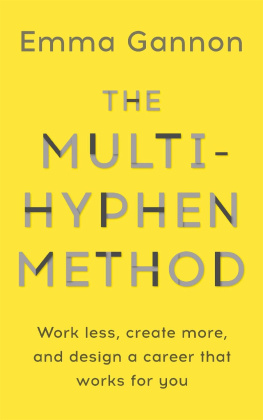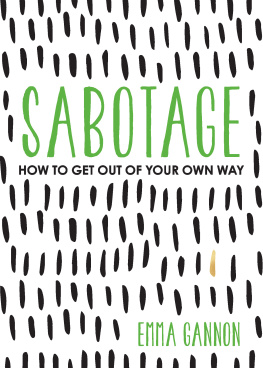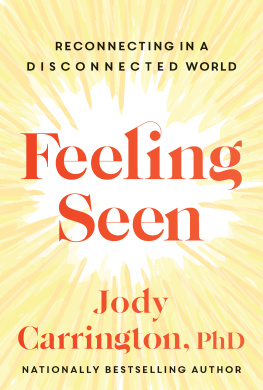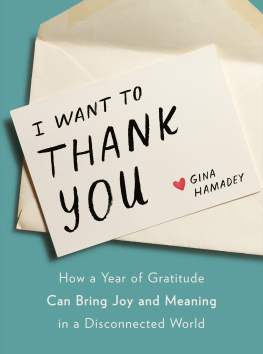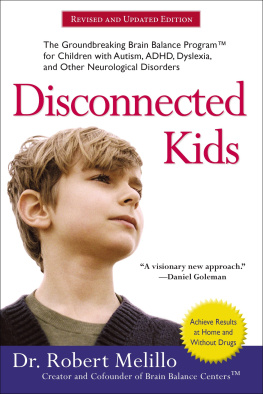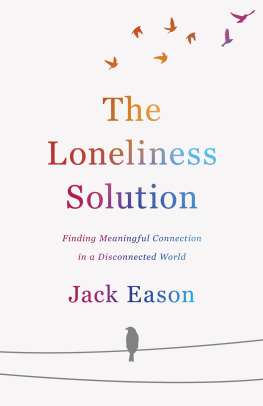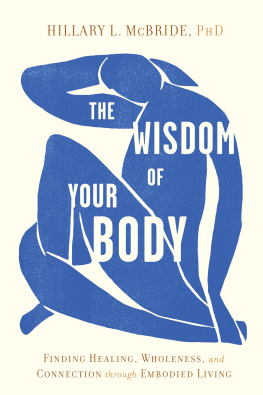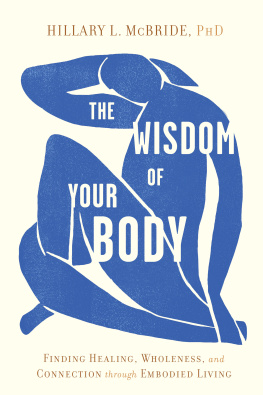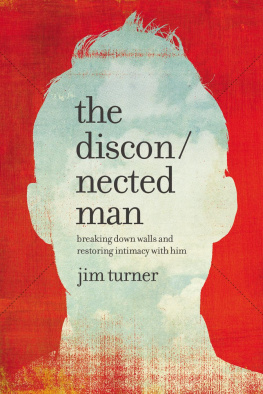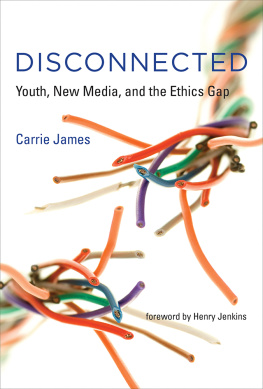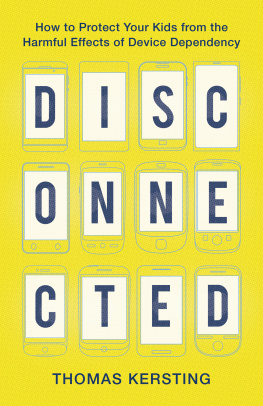Also by E mma Gannon
Ctrl, Alt; Delete: How I Grew Up Online
The Multi-H yphen Life
Sabotage
Olive
Contents
Introduction
When I think about the beauty of connection, I think about trees. Bear with meIm not asking you to hug them while wearing tie-dye and holding crystals (yet). But I do think we can all learn, during a time of utter chaos, how trees (said to be the oldest-living organisms on the planet) communicate with each other. In 1997, ecologist Suzanne Simard discovered that trees communicate their needs and send each other nutrients, even sending warning signals about environmental changes to each other. They keep each other in the loop, they stay connected, they compete sometimes but also protect each other. They use their network of roots to cooperate and help each other. Like the trees, whether we like it or not, we are all connected, even more so now through our screens and social media networks, and our actions have consequence s on each other. We have the power to cooperate and help each other or cut each other off. The harsh reality is, like the trees, we actually have the power to make each other sicker or stronger. Humans often treat trees as if they are disposable, but without them there would be no us. Without trees, all hope would be lost. Without each other, we would be lost too. We need each other more than ever. Be it climate change, a loneliness epidemic, or a global COVID-19 pandemic, the world is in crisis. Fear can make us pull away from each other when, really, we need to do the opposite. We could do with a good hug (human or tree, you r choice).
Like the trees, we have our own global networka network of billions made up of many different people at different points in life. The wiser, older trees have more knowledge and stronger rootswe also grow deeper into who we are with knowledge and age. Weve lived online for a while now, and it is no longer a shiny new toy. Perhaps we are going into our next phase. This book is about how we can connect better online, using the network we have at our fingertips, which we may often take for granted. A network that never ceases to amaze me: the good, the bad, and the ugly. How quickly we can rally together in times of need, and how quickly we can drag something down. We have the power to make or break things, including each other. When I first started writing this book, I thought I was going to write a book about how hyperconnected to everything we are yet at the same time worryingly disconnected from ea ch other. That is still partly what this book is about, but more crucially I realized it is a book not just about how disconnected we are from each other but more so from ourselves . The more individualistic our culture gets, the more we disconnect from each other and lose sight of a more common goal. Ironically, the more we obsess about our own individualism (how we look, how we are perceived, what we can get), the more we lose touch with our true individuality and how we can make a difference. With so much at our fingertipsso many choices, so many images whizzing past, so many distractions, so many algorithms, so many advertisementswe are in danger of forgetting who we are, what we like, what we want from life. The things that we love, the conversations we want to have, the lives we want to live. The internet, when used without a plan, can embed us further and further into the depths of man-made culture, full of distraction techniques, dodgy money schemes, and virtual arcade machines, and we could risk losing touch with our own human nature. We could be in danger of spending our lives engulfed in someone elses online game and missing out on the small moments of joy that happen to us every single day. We can either choose to use the internet to further real connection or use it to hide away and numb every thing out.
At the beginning, we were promised an internet world that would help us change things for the betterat least thats what I naively believed. The internet would help us educate and be educated, be a tool for everyone to access the knowl edge they needed; social media was to be a place to connect people and start social movements. In 2011, for example, it was said that Twitter played a pivotal role in the Arab Spring, amounting to more than two million tweets a day; Facebook was said to be reviving dormant relationships; and the Guardian wrote about how children with internet access were being given a huge advantage. A decade later, we are at a turning point, a point in time when we can reflect on what the internet has brought us up until now and decide how we want to use it for the better. When I google how to improve our internet experience, all I am met with is harder better faster stronger tips on getting a better internet connection or router. Boost your internet speed! Click here for time-saving internet advice! Hack your way to success! No, no! Im asking: How do we have a better experience , as humans, using these tools we plug into every single day? When I ask, How do we have a better time online? Im really asking, How do we have a better experience of life when so much of it is spent online? The two things arent as separate as we once thought they were. The internet really is our life now. Online and offline life arent separate entities. How we act online also reflects who we really are. Time for a big reflection, rest, reboot. After all, most of us cant just log off foreverand I wouldnt want to, either. When I am using it intentionally, the internet can be a completely magical gift enhancing all areas o f my life.
For so long, the internet was my portal to another life, a digital career, fascinating people, creative minds, life lessons, and travel inspiration. It felt like being inside a big arcade, pulling levers and not knowing what treat you might get. I could crack jokes with someone halfway across the world on Twitter, instead of talking to a boring housemate who I had nothing in common with. I could make money by not leaving the house. I could find out something huge about the history of the world that I was never taught at school. I could teach myself how to edit audio, or take care of a plant, or fix my headphones via a YouTube tutorial. Fast-forward to now. I feel sick at how much of my life its taken up without me really stopping to think. I feel sick at how many ocean views I have looked at through my phones camera lens instead of my own eyes. It was in 2016 that I wrote a book called Ctrl Alt Delete: How I Grew Up Online , in which I wrote about my love affair with the online world. I was an internet kid, and proud of it. Millennials are/were luckywe grew up alongside the beginning of the internet instead of being catapulted immediately into TikTok-land the moment we were born. We posted pixelated photos, didnt have many filters, were limited by a computer curfew and slow, loud dial-upjust one shared PC in a household with rules about how long we could spend on it. We were the first digital native generation. No wonder we are questioning our long, rocky relationship with the internet now that we a re adults.
The internet and the instant connection it brings have been sources of great positivity for me: Ive made friends for life (including, for example, a Twitter friend who lives in Lo s Angeles and who I met up with IRL five years agothankfully she hadnt catfished meand who years later I invited to my wedding); I have built a successful business, both emotionally and financially (and still live nomadically when I can with just my laptop in a tote bag); and I constantly still find myself connecting with thousands of like-minded people who make me feel fulfilled in my work. However. There was a time, mainly during my twenties, when I grew more dependent on the characterization and output of my online self and my connection to my devices, and I grew apart from who I was away from all of this. The amount of time I spent online building my brand and growing a community made me forgetful and distracted and ended up taking me away from the person I wanted to be. It took me away from my core relationships. I forgot birthdays, I was a terrible friend, I was zoned out. I was making more effort impressing strangers than nurturing relationships with those who truly love me for me. I felt distanced from myself, the person who had once had hobbies and enjoyed simple pleasures, who liked dancing and having picnics and listening to the birds. I was focused on growing followers and showcasing a polished exterior. If Id had an inner child, she would have been screaming at me to take a break, sit quietly, and reconnect with her. I was so addicted to growing my outwardly successful online self, feeding the hamster-wheel reward system of online validation, that I had momentarily lost track of the basics of my core being. As Dante calls it, I was climbing Mount Delectablegetting more and more rewards, collecting more and more career trophies to post online, but, you guessed it, I was less happy and more lonely. Now, I look at people who spend a lot of time outwardly peacocking and showboating their successes online and pause to question how they are rea lly doing.


